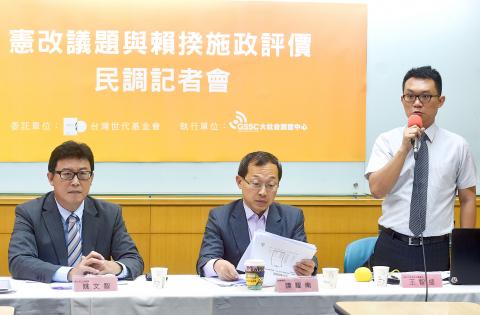Premier William Lai’s (賴清德) high approval rating of nearly 70 percent is believed to have helped boost President Tsai Ing-wen’s (蔡英文) rating toward 50 percent, while more than half of Taiwanese support a proposal to amend the Constitution, a poll released yesterday by the Taiwan Style Foundation showed.
Lai, who assumed the post on Sept. 8, has garnered the approval of 68.8 percent of respondents, while 23 percent expressed dissatisfaction.
Regarding Lai’s ability to revive the economy, 63.5 percent said they are confident, compared with 30.2 percent who said they were not, while 65.2 percent think his executive ability is good, compared with 21 percent who do not agree.

Photo: Chien Jung-fong, Taipei Times
The premier is heeding public opinion, according to 60.2 percent of respondents, while 30.3 percent said he is not.
Tsai’s approval rating stands at 49.7 percent, while her disapproval rating is at 45.1 percent. Just over half of respondents at 54.8 percent said they support Tsai, while 40.4 percent said they do not.
Tsai’s satisfaction rating had fallen to a record low of 18.4 percent in a poll released in May by Taiwan Democracy Watch ahead of the first anniversary of her presidency.
“In terms of polling performance, the [administration] has weathered an unstable period after Lai’s inauguration,” Democratic Progressive Party (DPP) Legislator Pasuya Yao (姚文智) said.
The poll suggests that controversies surrounding the administration’s reform policies have ended, while efficiently implementing the policies is to be the next challenge, foundation board director Wang Zhin-sheng (王智盛) said.
When asked about a proposal by Tsai and the DPP to amend the Constitution, 56 percent of respondents said they approve, while 22.1 percent disapproved.
Half of the respondents opposed lowering the minimum voting age from 20 to 18, while 46.8 percent approved of the potential constitutional amendment.
Human rights protection should be codified into the Constitution, 69.8 percent of the respondents said, but 17.3 percent said it is not necessary.
Seventy-two percent believe that legislative elections should be revised to prevent unequal representation, while 17.8 percent said the revision is not necessary.
While 80.9 percent of respondents are in favor of a proposal put forth by Tsai in her Double Ten National Day address to hold a political party leaders’ meeting, 13.6 percent disapproved.
Regarding cross-strait policy, two-thirds of respondents said they support Tsai’s statement that the nation would continue to show goodwill and stay true to its promises without returning to a confrontational relationship or succumbing to Beijing’s pressure, while 24.9 percent said they disapproved.
The poll conducted on Thursday and Friday collected 1,072 valid samples and has a confidence level of 95 percent with a margin of error of 2.99 percentage points.

CHAOS: Iranians took to the streets playing celebratory music after reports of Khamenei’s death on Saturday, while mourners also gathered in Tehran yesterday Iranian Supreme Leader Ayatollah Ali Khamenei was killed in a major attack on Iran launched by Israel and the US, throwing the future of the Islamic republic into doubt and raising the risk of regional instability. Iranian state television and the state-run IRNA news agency announced the 86-year-old’s death early yesterday. US President Donald Trump said it gave Iranians their “greatest chance” to “take back” their country. The announcements came after a joint US and Israeli aerial bombardment that targeted Iranian military and governmental sites. Trump said the “heavy and pinpoint bombing” would continue through the week or as long

TRUST: The KMT said it respected the US’ timing and considerations, and hoped it would continue to honor its commitments to helping Taiwan bolster its defenses and deterrence US President Donald Trump is delaying a multibillion-dollar arms sale to Taiwan to ensure his visit to Beijing is successful, a New York Times report said. The weapons sales package has stalled in the US Department of State, the report said, citing US officials it did not identify. The White House has told agencies not to push forward ahead of Trump’s meeting with Chinese President Xi Jinping (習近平), it said. The two last month held a phone call to discuss trade and geopolitical flashpoints ahead of the summit. Xi raised the Taiwan issue and urged the US to handle arms sales to

State-run CPC Corp, Taiwan (CPC, 台灣中油) yesterday said that it had confirmed on Saturday night with its liquefied natural gas (LNG) and crude oil suppliers that shipments are proceeding as scheduled and that domestic supplies remain unaffected. The CPC yesterday announced the gasoline and diesel prices will rise by NT$0.2 and NT$0.4 per liter, respectively, starting Monday, citing Middle East tensions and blizzards in the eastern United States. CPC also iterated it has been reducing the proportion of crude oil imports from the Middle East and diversifying its supply sources in the past few years in response to geopolitical risks, expanding

Pro-democracy media tycoon Jimmy Lai’s (黎智英) fraud conviction and prison sentence were yesterday overturned by a Hong Kong court, in a surprise legal decision that comes soon after Lai was jailed for 20 years on a separate national security charge. Judges Jeremy Poon (潘兆初), Anthea Pang (彭寶琴) and Derek Pang (彭偉昌) said in the judgement that they allowed the appeal from Lai, and another defendant in the case, to proceed, as a lower court judge had “erred.” “The Court of Appeal gave them leave to appeal against their conviction, allowed their appeals, quashed the convictions and set aside the sentences,” the judges